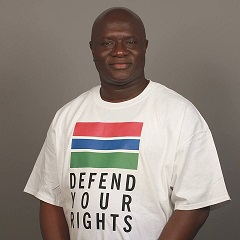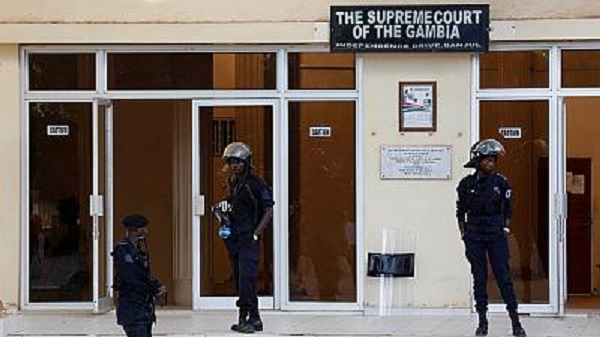
(JollofNews) – The Barrow Administration through its Attorney General must be hugely commended for their submission in the Supreme Court in favour of the GPU case to declare sedition unconstitutional and void. If the unfolding news that the Supreme Court is heading towards such declaration then this would be an outcome that must be celebrated as the most significant human rights achievement the Gambia has witnessed since 1970.
For many years now the Gambia Press Union has been challenging the constitutionality of sedition provisions in the Criminal Code, in particular Sections 41 (publishing false news with intent to cause fear or alarm to the public), 51 (seditious intention) and 52 (false publication). These are provisions that practically criminalize any form of expression which the government thinks is insulting to the president or portrays the government as bad.
We all can recall when Foroyaa employee Bai Mass Kah was charged for sedition in 2013 for merely saying ‘paste the picture of Tyrant Yaya Jammeh on the sky’. We can also recall when Fatou Badgie was also briefly tried for insulting Pres. Adama Barrow few months ago. Above all we could also recall the case of the six journalists who were all sentenced for seditious publication by Mercenary Justice Emmanuel Fagbele on all six counts and to two years imprisonment without the option of a fine for four of the counts and fined each D250, 000 in 2009. The six journalists were Emil Touray, Sarata Jabbi Dibba, Pa Modou Faal, Pap Saine, Ebou Sawaneh and Sam Sarr.
Sedition is a draconian law conceived and used by the colonialists to deny oppressed peoples from demanding their freedom and holding them to account. Since then tyrannical regimes in former colonies also took it up as a weapon to oppress their people. In the Gambia, this law was further expanded and more frequently used under the APRC Tyranny just to ensure that no one could speak his or her opinion that is not in favour of Yaya Jammeh and his criminal regime. For example, Section 51(1)(a) in the Criminal Code defines Seditious Intention as any intention that “bring into hatred or contempt or to excite disaffection against the person of the President, or the Government of The Gambia as by law established.” By this single line alone, it means even if you said the president is ugly or incompetent or dishonest then you would have caused a criminal offence and jailed!
When one understands the meaning of sedition laws fully, one would realize that this is a law that goes deep into the very sovereignty of the citizen. This is because sedition effectively disempowers a citizen completely by shutting your mouth and thoughts about how your society is run. This law effectively puts public officers and the government above the law and beyond scrutiny. It therefore kills transparency and accountability of the state, which means this law, can only promote corruption, abuse of power and destruction of human rights. If there is any law that kills the voices and sovereignty of citizens, it is sedition law.
Therefore there should be no sedition law in any republic. Hence sedition laws violate Section 1 subsection 2 of the Gambia Constitution, which states that the sovereignty of the Gambia resides in the people and the state derives its legitimacy from the people. Sedition laws also directly violate Section 25 of our Constitution, which is an entrenched clause that guarantees freedom of expression, as well as Section 207, which guarantees the freedom of the media.
If the Gambia declares sedition as unconstitutional and therefore expunge it out of our books, we would become the only second African country to do so after Uganda in 2010. In 2005 the East African Media Institute based in Kenya and a Uganda journalist Andrew Mwenda challenged the sedition laws of Uganda as unconstitutional. After five years of proceedings, on 25 August 2010, the Ugandan Constitutional Court, by a unanimous decision, declared Sections 39 and 40 of the Ugandan Penal Code Act on sedition unconstitutional and therefore void. The case came about when the journalist Andrew Mwenda was charged with inciting public hatred against the Tyrant Yoweri Museveni for stating during a live radio program that the Ugandan government was partly to blame for the death of the late Dr. John Garang of Sudan in a helicopter crash that year. During the radio program this was some of the things the journalist said,
“Museveni can never intimidate me. He can only intimidate himself … the President is becoming more of a coward and every day importing cars that are armor plated and bullet proof and you know moving in tanks and mambas, you know hiding with a mountain of soldiers surrounding him, he thinks that, that is security. That is not security. That is cowardice… Actually Museveni’s days are numbered if he goes on a collision course with me… You mismanaged Garang’s Security. Are you saying it is Monitor that caused the death of Garang or it is your own mismanagement?”
In it’s ruling the Constitutional Court recognized that the Uganda Constitution guaranteed freedom of expression. The Court went further to note that the offence of sedition is so vague that one may not know its boundary. It argued that people express their thoughts differently depending on many factors such as their upbringing and education. Hence all people cannot be expected to express themselves in the same way about any issue. But the Court noted that all citizens must enjoy equal rights under the constitution and this includes criticizing leaders rightly or wrongly. The Court therefore called on leaders to grow thick skin to bear the harsh words of citizens.
What the Ugandan court is therefore implying is that in a democracy, citizens must have the freedom to express themselves. Such expression could be right or wrong but so long as it is one’s opinion, one must have the freedom to say what is on your mind. This is important for holding leaders to account, ensure good governance and demand efficient public service delivery among others.
When you have sedition laws it means therefore thought is criminalized as soon as you express it. Human beings are thinking animals by nature and when we speak or write it is our thoughts or ideas that we express. Hence if you have a law that controls what ideas you must express then it means that law is effectively saying that no one should think. This is because so long as people think, they will also express what they think.
In the context of a republic, it is such thinking that determines the manner of government. For example how do you know which candidate or party to vote for if you do not think and ask questions? How do we convince each other and campaign for votes if we do not express ourselves by criticizing each other, to agree or disagree? Hence sedition laws seek to kill democracy and introduce dictatorship so that no one thinks other than the president and whosoever that president wants to think. This was how Yaya Jammeh was ruling the Gambia, which is why hundreds of our citizens were charged for sedition including giving false information to a public officer.
I wish to therefore commend the GPU for persisting on this case. Above all I wish to commend the Attorney General and the Barrow Administration for taking this stance to hand over power to the people. Without freedom of expression, there is no people’s power. With sedition, everyone is a slave in his or her society. On December 1, we decided for the supremacy of our sovereignty and power.
God Bless the Gambia.






I must admit to feeling uneasy about this Barrow government;